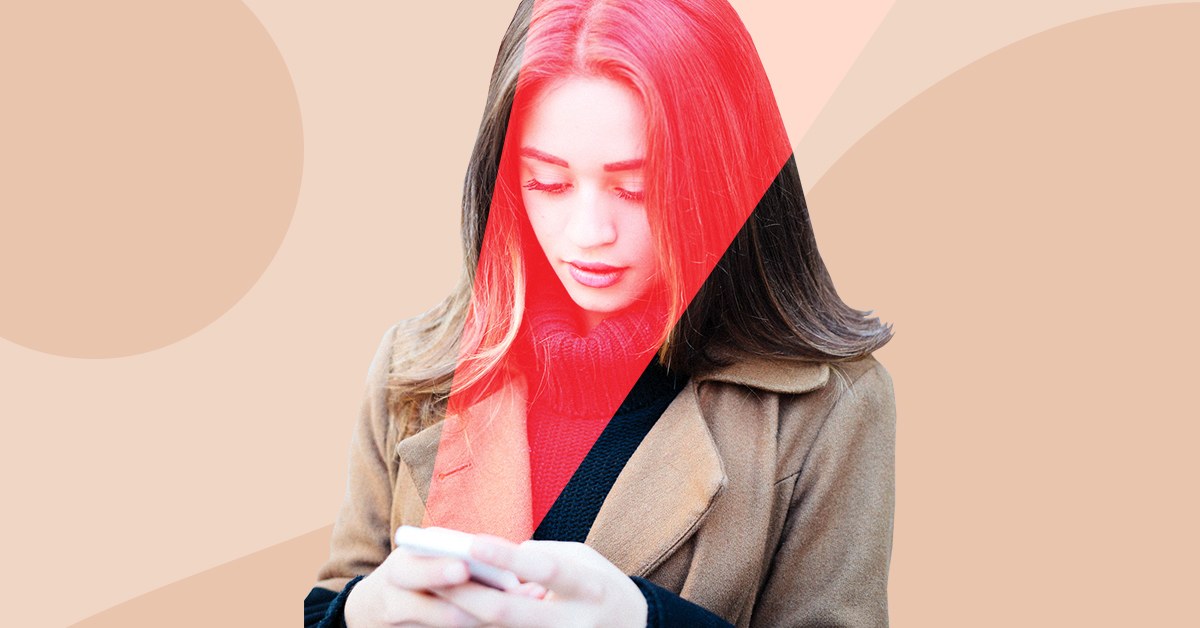Feeling Burned Out? Your Screen Time May Have Something to Do With It

So many health and well-being articles start with an idea “we all know.” We all know exercise is good for us. We all know healthy foods are, uh, healthy. And these assertions often come along with a “just”—some prescriptive self-care step you should just take already. Just eat better! Just move more! You get the idea. What’s missing: How we live in 2018 lives, and whether those tasks are even doable. Take, for example, screen time.
Study after study points to the dangers of looking at screens too much. The blue light from devices like phones and computers can send our circadian rhythms out of whack and cause eye strain. We all know that, right? But it’s not like each of us has chosen to sacrifice our sleep, health, and eyesight for the fun of right-swiping or Netflix. And for most of us, screens are an integral part of our jobs.
A new survey of 1,001 adults with self-reported dry eye symptoms, conducted by Shire as part of its Eyelove “Screen Responsibly” initiative found that nearly one in three adults said they use screens 10 or more hours a day. And 90 percent of adults in the survey reported their screen use as “unavoidable.”
And yet a majority of the 1,000 ophthalmologists and optometrists surveyed agreed that 10-plus hours a day of screen time is too much. But a digital detox is little more than a mean joke to anyone who works online, uses email, needs to calendar with colleagues, relies on project management software, interfaces with customers—and countless other functions of a modern workforce that happen onscreen. So, who will truly save us from this?
“It’s both an employer and a personal responsibility,” says Arianna Huffington, who sees screen fatigue as a big driver of burnout. In 2007, Huffington had a fainting incident in the middle of a workday, an event that was a red flag that the publishing magnate needed to get some rest. Convinced a well-rested workforce would benefit her business’s bottom line as well as the people who work there, she had nap pods installed at HuffPost HQ. She went on to write two books about personal wellbeing and to launch Thrive Global, her wellness company that offers consultant services on corporate health culture, online resources, and an app that alerts contacts when you are taking a break from your phone, so you can be out there “thriving away.” Here’s what Huffington has to say about screening responsibly, without having to quit your phone—or your job.
You’ve been speaking out about burnout culture since 2007. How is screen time a part of your new mission?
“Our relationship to technology and to screens is one of the big conversations of the moment. This is the con… One in three adults say they use screens over 10 hours a day, which most eye doctors say is too much; and over 40 percent use multiple screens at the same time.”
Most survey respondents reported that their screen use is “unavoidable.” How do we reconcile the demands of our jobs with the desire to unplug?
“There are two answers to that. At Thrive we are working with corporations to improve their cultures and to set clear expectations about what employees are expected to do after work. It’s not just what you’re doing at work; are you expected to answer emails and texts after work? Because that creates the additional eye strain of screens plus the additional stress of never having some real time to yourself. But also what we are finding is that people may leave work and then get lost in screens because they are addicted to their social media or games or Snapping or texting all night. So it’s both an employer and a personal responsibility.”
How can we “screen responsibly”? What does this look like?
“One of the things screen responsibly recommends is taking some time every 20 minutes—taking a 20 second break and looking 20 feet into the distance. That isn’t even a major time commitment but it makes a difference. That, or adjusting your screen lighting so your eyes aren’t strained, are simple ways to screen responsibly.
Pauses are so important, even though we don’t have to think of it as a major change in our day. People change through microscopic changes in their daily life, which then become habit and significantly affect our health and our productivity. [At Thrive] we have banned screens at meetings. If you are at a meeting, really be present and participate rather than trying to multitask; people are very productive when they do that. Or take a walking meeting now that the weather has improved. These are all things that we recommend that make a difference.”
There’s a lot of talk of self-care and how that can be a privilege—not everyone can afford massages and organic food, for example. Do you think minimizing burnout or minimizing screen time should be seen as a necessity and not a luxury? How do you get that message out?
“Absolutely. We are not talking about things that cost money; we are talking about pauses and breaks throughout the day. It’s not a matter of privilege—it’s something for everybody. There are things that are not in our control and there’s also a lot that is in our control. And you want to empower people to do what’s right.”
